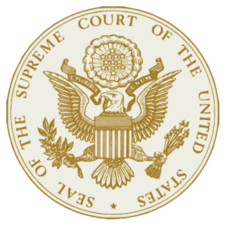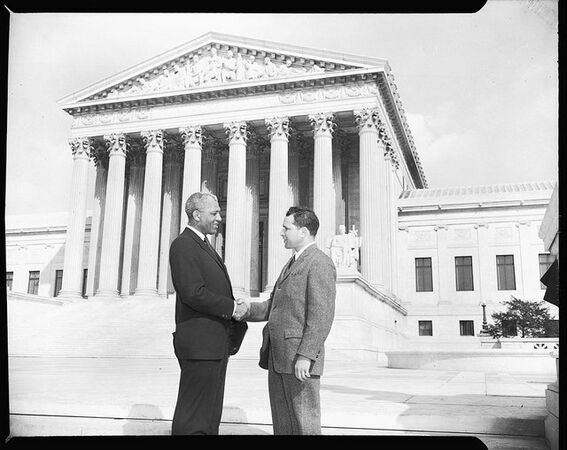Financial Oversight and Management Board for Puerto Rico v. Aurelius Investment LLC
 | |
| Financial Oversight and Management Board for Puerto Rico v. Aurelius Investment LLC | |
| Term: 2019 | |
| Important Dates | |
| Argument: October 15, 2019 Decided: June 1, 2020 | |
| Outcome | |
| Reversed and remanded | |
| Vote | |
| 9-0 | |
| Majority | |
| Stephen Breyer • Chief Justice John G. Roberts • Ruth Bader Ginsburg • Samuel Alito • Elena Kagan • Neil Gorsuch • Brett Kavanaugh | |
| Concurring | |
| Clarence Thomas • Sonia Sotomayor | |
Financial Oversight and Management Board for Puerto Rico v. Aurelius Investment LLC is a 2020 U.S. Supreme Court case involving how the Appointments Clause found in Article II of the U.S. Constitution applies to U.S. territories. The court ruled 9-0 to uphold the practice of presidents appointing members of the Puerto Rican Financial Oversight and Management Board (FOMB) without confirmation by the U.S. Senate. Justice Stephen Breyer's majority opinion states that the Appointments Clause does not restrict the appointment process for "local officers that Congress vests with primarily local duties."[1]
The court heard oral argument on October 15, 2019, during the court's October 2019-2020 term. The case came on a writ of certiorari to the United States Court of Appeals for the 1st Circuit.
The case is consolidated with:
- Aurelius Investment LLC v. Puerto Rico,
- Official Committee of Debtors v. Aurelius Investment LLC,
- United States v. Aurelius Investment LLC, and
- UTIER v. Financial Oversight and Management Board for Puerto Rico.
Why it matters: The court’s decision in this case established that the Appointments Clause does not restrict the appointment method of local officers that Congress vests with primarily local duties.[4]
You can review the lower court's opinion here.
Timeline
| Five Pillars of the Administrative State |
|---|
| Executive control |
|
•Court cases |
| More pillars |
| •Agency control • Executive control •Legislative control • Public control |
| Click here for more coverage of the administrative state on Ballotpedia.
|
| Click here to access Ballotpedia's administrative state legislation tracker. |
The following timeline details key events in this case:
- June 1, 2020: The U.S. Supreme Court reversed the ruling of the First Circuit and remanded the case.
- October 15, 2019: Oral argument
- June 20, 2019: The U.S. Supreme Court agreed to hear the case.
- April 23, 2019: The Financial Oversight and Management Board for Puerto Rico, the petitioner, filed a petition with the U.S. Supreme Court.
- February 15, 2019: The First Circuit reversed in part and affirmed in part the ruling of the District of Puerto Rico.
Background
Creation of the Financial Oversight and Management Board
On June 30, 2016, Congress enacted the 2016 Puerto Rico Oversight, Management, and Economic Stability Act ("PROMESA") under the Territorial Clause of the U.S. Constitution. The Territorial Clause gives Congress the power to make rules and regulations for U.S. territory.[2]
PROMESA created the Financial Oversight and Management Board and authorized the board to begin debt adjustment proceedings on behalf of the Puerto Rico government. The board began proceedings in May 2017.[2]
The seven-member board is made up of one member chosen at the president’s discretion and six other members selected by the president from a list compiled by members of Congress. The appointees selected from the congressional list are not subject to Senate confirmation.[2]
Appointments Clause challenge
Aurelius Investment LLC ("Aurelius") and the Unión de Trabajadores de la Industria Eléctrica y Riego ("UTIER"), filed lawsuits in the United States District Court for the District of Puerto Rico challenging the board's authority, arguing the board members' appointment violated the Appointments Clause of the U.S. Constitution. The Appointments Clause establishes the president shall nominate and appoint, with the advice and consent of the U.S. Senate, "all other Officers of the United States" whose appointments are not already provided for in the Constitution and gives Congress the power to allow the president to appoint "such inferior Officers, as they think proper."[2]
The board rejected these arguments, responding: (1) board members were not "Officers of the United States" under the Appointments Clause because the board's powers were local in nature, not federal; (2) the Appointments Clause did not apply because the board's authority was in Puerto Rico, and the Territorial Clause exempted Congress from complying with the Appointments Clause regarding Puerto Rico-related legislation; and (3) the board did not require Senate confirmation because the members were "inferior officers" under the Appointments Clause.[2]
The District of Puerto Rico ruled against Aurelius and UTIER in two separate decisions. On appeal, the 1st Circuit Court of Appeals reversed the district court in part, holding the board members "must be, and were not, appointed in compliance with the Appointments Clause."[2]
The board filed a petition with the U.S. Supreme Court, arguing Congress clearly meant the board to be a territorial entity and thus exempt from Senate confirmation under the Appointments Clause. The board wrote in its petition, "The court of appeals’ decision represents a radical departure from two centuries of this Court’s jurisprudence holding that the Constitution’s separation-of-powers constraints do not restrict the forms of territorial government that Congress can choose to adopt when it exercises if Article IV power to make all needful rules for the territories."[5]
What is the Appointments Clause?
- See also: Appointment and removal power
The Appointments Clause provides the president with the authority to appoint officers of the United States, subject to confirmation by the U.S. Senate. These positions include ambassadors, heads of Cabinet-level departments, and federal judges.[6][7]
Congress itself does not exercise appointment authority. However, the Appointments Clause calls for Congress to vest the authority to appoint inferior officers in the president, the courts, or heads of departments. [6]
Questions presented
The petitioner presented the following question to the court:
| Question presented: Whether the Appointments Clause governs the appointment of members of the Financial Oversight and Management Board for Puerto Rico.[3] |
Oral argument
Audio
Transcript
Outcome
The U.S. Supreme Court reversed and remanded the First Circuit's ruling with a 9-0 vote in favor of the Financial Oversight and Management Board for Puerto Rico.[1]
Justice Stephen Breyer delivered the opinion of the court. Chief Justice John G. Roberts and Justices Ruth Bader Ginsburg, Samuel Alito, Elena Kagan, Neil Gorsuch, and Brett Kavanaugh joined the full opinion. Justices Clarence Thomas and Sonia Sotomayor each wrote concurring opinions.[1]
Opinions
Opinion of the court
A majority of the justices held that while the Appointments Clause applies to officers of the United States who exercise power in Puerto Rico, it does not forbid the president from appointing members of the Financial Oversight and Management Board (FOMB) without U.S. Senate confirmation.[1]
In the opinion of the court, Justice Stephen Breyer wrote:[1]
| “ | [W]hile the Appointments Clause does restrict the appointment of “Officers of the United States” with duties in or related to the District of Columbia or an Article IV entity [like Puerto Rico], it does not restrict the appointment of local officers that Congress vests with primarily local duties...[8] | ” |
He went on to argue that even though decisions made by the FOMB might have nationwide consequences the board's powers focus on local matters and the members of the board have local duties.[1]
Concurring opinion
In his concurring opinion, Justice Clarence Thomas wrote that the court came to the right conclusion, but said he would have relied on the original public meaning of the phrase officers of the United States to resolve the case. He argued:[1]
| “ | Territorial officials performing duties created under Article IV of the Constitution are not federal officers within the original meaning of the phrase “Officers of the United States.” Since the founding, this Court has recognized a
distinction between Article IV power and the powers of the National Government in Articles I, II, and III.[8] |
” |
In her concurring opinion, Justice Sonia Sotomayor wrote that "territorial status should not be wielded as a talismanic opt out of prior congressional commitments or constitutional constraints."[1] She stated that the parties to the case did not address the implications of Puerto Rican home rule on Appointments Clause questions, so she chose to concur in the judgment of the court.
Text of the opinion
Read the full opinion here.
Commentary about the case
Post-decision commentary
- See also: Appointment and removal power
Amy Howe, a reporter for SCOTUSblog, wrote that the ruling "sends the case back to the lower court for further proceedings, but it is a decisive victory for the board and a defeat for the hedge fund and labor union that had challenged the appointments."[9]
John Kruzel, a staff writer for The Hill, argued, "A ruling against the board would have created more fiscal turmoil for Puerto Rico as it continues to recover from a financial crisis that began in 2014 and proved to be the worst in its history, swelling to some $74 billion debt through bonds and $49 billion in unpaid pensions."[10]
See also
External links
- U.S. Supreme Court docket file - Financial Oversight and Management Board for Puerto Rico v. Aurelius Investment LLC (petitions, motions, briefs, opinions, and attorneys)
- SCOTUSblog case file for Financial Oversight and Management Board for Puerto Rico v. Aurelius Investment LLC
- U.S. Supreme Court docket file - Aurelius Investment LLC v. Puerto Rico (petitions, motions, briefs, opinions, and attorneys)
- SCOTUSblog case file for Aurelius Investment LLC v. Puerto Rico
- U.S. Supreme Court docket file - Official Committee of Debtors v. Aurelius Investment LLC (petitions, motions, briefs, opinions, and attorneys)
- SCOTUSblog case file for Official Committee of Debtors v. Aurelius Investment LLC
- U.S. Supreme Court docket file - United States v. Aurelius Investment LLC (petitions, motions, briefs, opinions, and attorneys)
- SCOTUSblog case file for United States v. Aurelius Investment LLC
- U.S. Supreme Court docket file - UTIER v. Financial Oversight and Management Board for Puerto Rico (petitions, motions, briefs, opinions, and attorneys)
- SCOTUSblog case file for UTIER v. Financial Oversight and Management Board for Puerto Rico
Footnotes
- ↑ 1.0 1.1 1.2 1.3 1.4 1.5 1.6 1.7 1.8 U.S. Supreme Court, "Financial Oversight and Management Board for Puerto Rico v. Aurelius Investment, Inc.," June 1, 2020
- ↑ 2.0 2.1 2.2 2.3 2.4 2.5 2.6 United States Court of Appeals for the 1st Circuit, Aurelius Investment, LLC v. Commonwealth of Puerto Rico, decided February 15, 2019
- ↑ 3.0 3.1 Supreme Court of the United States, Financial Oversight and Management Board for Puerto Rico v. Aurelius Investment LLC: "Questions presented," accessed July 3, 2019 Cite error: Invalid
<ref>tag; name "question" defined multiple times with different content - ↑ SCOTUSblog, "Argument analysis: Justices weigh appointments dispute – and nature of Puerto Rico oversight board," October 15, 2019
- ↑ Supreme Court of the United States, Financial Oversight and Management Board for Puerto Rico v. Aurelius Investment, LLC: "Petition for a writ of certiorari," accessed July 3, 2019
- ↑ 6.0 6.1 Encyclopedia of the American Constitution, "Appointing and Removal Power, Presidential," accessed October 4, 2018
- ↑ Law Shelf, "Presidential powers," accessed October 4, 2018
- ↑ 8.0 8.1 Note: This text is quoted verbatim from the original source. Any inconsistencies are attributable to the original source.
- ↑ SCOTUSblog, "Opinion analysis: After a long wait, a unanimous court upholds Puerto Rico oversight board," June 1, 2020
- ↑ The Hill, "Supreme Court backs financial board overseeing Puerto Rico's debt," June 1, 2020
| |||||||||||



